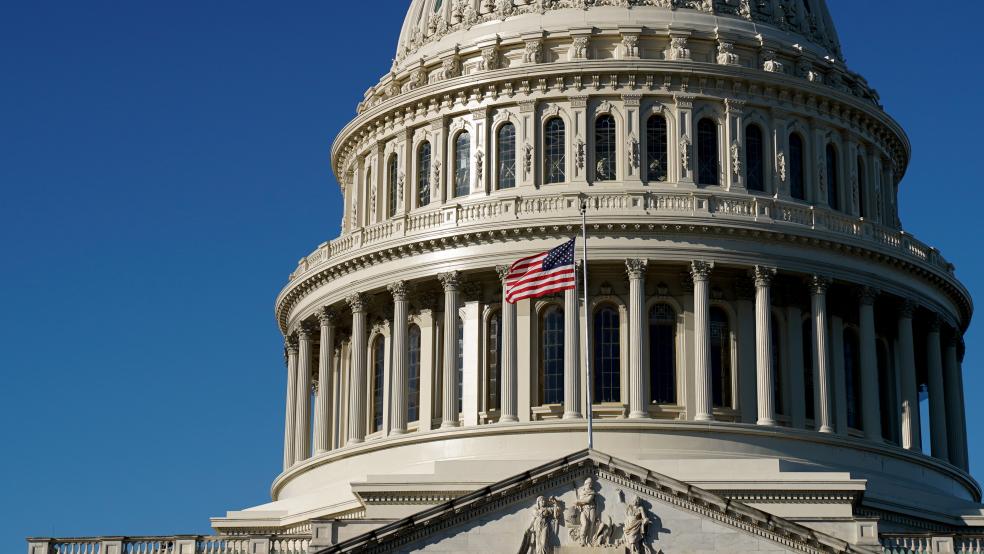The federal budget deficit will reach an estimated $1.9 trillion in fiscal year 2024, according to an updated outlook released by the Congressional Budget Office Tuesday. The new projection represents a big jump from the $1.5 trillion estimate released just four months ago. The CBO cited a number of factors for the 27% increase, including the expansion of President Joe Biden’s student loan forgiveness plan, a new package of aid for U.S. allies and increased spending on healthcare.
From 2025 to 2034, CBO now projects a cumulative deficit of $22.1 trillion, more than $2 trillion larger than projected in February.
In a statement, CBO Director Phillip L. Swagel noted that the projected deficits are exceptional, “about 70 percent larger than their historical average over the past 50 years when measured in relation to economic output.”
Adjusting for shifts in the timing of some payments, the deficit this year will equal 7% of gross domestic product, and deficits will equal or exceed 5.5% of gross domestic product every year from 2024 to 2034; deficits have not been that large relative to the size of the economy for more than five years in a row since at least 1930.
The new estimates show that the national debt will increase significantly, as well, rising to $50.7 trillion by 2034. At that point, total federal debt will equal 122% of GDP, up from the current 99% and far exceeding the record level of 106% set in 1946, just after World War II.
The real-world numbers could be even bigger, too, since the CBO forecast assumes the 2017 tax cuts will expire as scheduled in 2025 — which seems unlikely in the current political climate. Extending the tax cuts in full — which Republicans have vowed to do — will cost an estimated $4.6 trillion, according to a previous CBO analysis.
Some key details: Digging into the details of the roughly $400 billion increase in the estimated 2024 deficit, CBO said it increased its projected outlays for student loan forgiveness by $145 billion, based in part on actions and proposals by the Biden administration this year. The aid package for Ukraine, Israel and the Indo-Pacific region added $95 billion to the estimated deficit, while lower recoveries from bank failures resulted in a $70 billion increase in projected spending at the Federal Deposit Insurance Corporation (an increase that could be erased in future years as recoveries are recorded). Higher-than-expected spending on Medicaid accounted for another $50 billion in additional deficit.
Mounting interest payments: Rising interest costs are another factor pushing up debt and deficit projections. CBO estimates that interest payments will come to $892 billion in 2024, more than twice as high as they were just three years ago. By 2034, interest payments will rise to $1.7 trillion, or about 4.1% of GDP, exceeding the record high of 3.2% of GDP seen in 1991.
Economic projections: CBO now sees a stronger economy this year, with GDP growth of 2%, up from the 1.5% rate projected in February. Inflation will also be higher, 2.7% instead of 2.1%, and unemployment lower, with the jobless rate averaging 3.9%, below the 4.2% estimate previously.
The economy is getting a boost from higher-than-expected immigration, CBO said. The non-partisan agency estimates that the surge in immigration will help reduce deficits through higher economic growth, with the economy being $8.9 trillion, or 2.4%, larger over the 2024–2034 period than it would have been otherwise, and deficits being $0.9 trillion smaller.
Politics of debt: Republicans blamed Biden and the Democrats for the big jump in the deficit estimate. “Congressional Democrats and the White House ought to read this report cover to cover. After reviewing the data, it’d be unthinkable for anyone to consider continuing down the current fiscal path,” Senate Budget Committee Ranking Member Chuck Grassley of Iowa said in a statement. “The CBO’s long-term outlook leaves Washington bureaucrats with one viable option: to quit wasting taxpayers’ money and start making some sane spending decisions.”
Democrats celebrated the positive economic news, while calling out Republican tax cuts as a problem. “Even as today’s forecast shows the fiscal fallout caused by the GOP’s tax cuts for the wealthy, they’re attempting to further blow up the deficit by spending $4 trillion” to extend the cuts, said Rep. Brendan Boyle, the top Democrat on the House Budget Committee. “While Republicans will keep pushing their tired, ‘trickle down’ schemes, Democrats will keep fighting to lower costs and invest in America.”
The White House said the CBO report shows the need to pass Biden’s budget plan, which includes tax increases on corporations and the wealthy. Press Secretary Karine Jean-Pierre told reporters that lawmakers should act to avoid “blowing up the debt with $5 trillion of more Trump tax cuts.”
Clarification: This article has been updated to reflect that only part of the $145 billion increase in projected outlays for student loan forgiveness stems directly from Biden administration's new debt forgiveness proposals. CBO said that Department of Education revisions to the estimated costs of outstanding loans added $74 billion to its projected deficit, while Biden’s debt forgiveness proposal added $66 billion, which is only half of the estimated total cost of the plan. If the rule is finalized the other $66 billion will be added to CBO's calculations.




